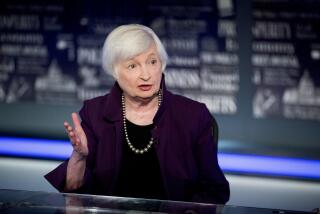S&P; Says It Will Change Its Credit-Rating Process
- Share via
Standard & Poor’s announced plans Friday to revamp its credit-rating process, as the New York-based agency and its rivals respond to criticism that they were too slow last fall to downgrade energy trader Enron Corp., which filed for bankruptcy in December.
“Many of these changes have been underway since last fall, including publishing commentary more frequently so that the markets hear from us after routine events such as earnings calls and management changes,” said Clifford Griep, S&P;’s chief credit officer. He said forward-looking commentary will help identify “credit cliff situations,” in which the credit-worthiness and rating could decline precipitously.
S&P;, a division of McGraw-Hill Inc., said it plans to make its rating actions more timely and offer more commentary; explain how off-balance-sheet activities are incorporated into the rating process; provide more details on the dangers of third-party financing falling through; and push for mandatory disclosure of so-called triggers, increasingly common clauses in financing agreements that boost a company’s borrowing costs after a rating downgrade.
Triggers in Enron’s financing arrangements and problems with off-balance-sheet financing were prominent in its collapse.
Credit ratings, which S&P; issues on a scale from AAA to D, affect the ability of companies to borrow money--and what they pay for it.
In the last week, rivals Moody’s Investors Service and Fitch also said they are considering changes to how they rate companies. And in the wake of Enron’s collapse, companies such as Kmart Corp., which also has filed for bankruptcy, have found that rating agencies and bankers are cutting them far less slack.
Bond fund managers said S&P;’s changes could benefit the credit market by making available more information, but cautioned that quicker downgrades could heighten trading volatility.
Some managers expressed concern about a provision of S&P;’s plan that would “incorporate security price behavior into its surveillance process.”
“In the long term, I don’t see how the rating process becomes more proactive if it’s heavily influenced by stock market pressures,” said John Bender, co-manager of the Strong Corporate Bond Fund. “The process should be based on business fundamentals rather than equity market psychology.”
More to Read
Inside the business of entertainment
The Wide Shot brings you news, analysis and insights on everything from streaming wars to production — and what it all means for the future.
You may occasionally receive promotional content from the Los Angeles Times.









